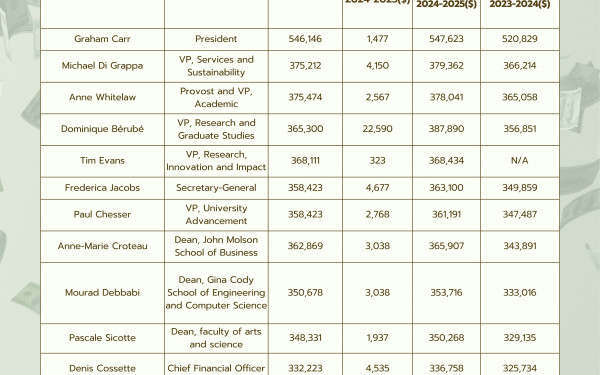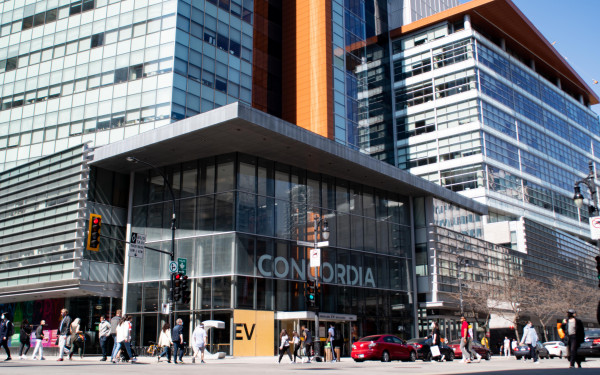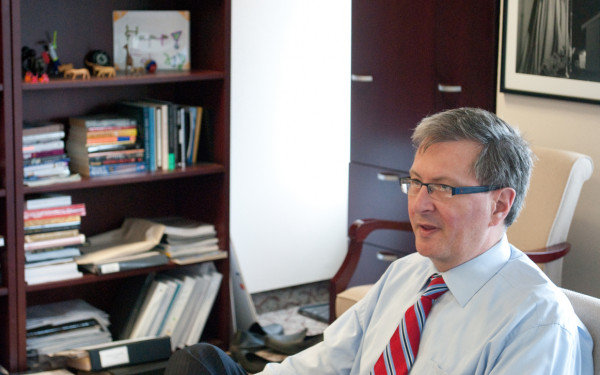Talking With The President
The Link Chats With New ConU President Alan Shepard
Classes don’t start for another week, but there’s already a new face on campus.
On Aug. 1, Alan Shepard officially took office as Concordia’s brand new president and vice-chancellor.
Shepard takes office at an interesting point in the university’s history, following on the heels of former interim-president Frederick Lowy and a slew of recent presidential and administrative embarrassments that have put Concordia in the headlines for all the wrong reasons.
Fresh from a five-year term in Ontario as provost, vice-president academic and chief operating officer at Ryerson University, Shepard joins Concordia’s community with high hopes.
From his humble beginnings as a self-professed “farm kid in the rural American midwest,” to a graduate student in the American south, an administrator in Texas and then Ontario, Shepard claims to have grown accustomed to big transitions.
He says that his job as president has been a long time coming.
“Some of the skill sets of being a president are things I’ve been working on for a really long time,” said Shepard. “Any time you’re in these senior admin roles, there are certain things you need to learn about budgets, how things work and what the issues are.”
Shepard says that the best training ground for his work as an administrator came early in his career when he ran a university-wide accreditation project at Texas Christian University.
“What was great was that I got to learn how these places work,” he said. “How sports programs work, how funding, insurance, security as well as all the academic programs work. Not many profs get that kind of moment early in their career, getting to have a bird’s-eye view of the whole [university]. It was then that I became really keen [for] these kinds of jobs, these kinds of opportunities.”
Despite being transposed into a foreign province in the midst of political turmoil, to a university struggling to clean up its image during one of the largest social movements in recent history, Shepard is surprisingly optimistic.
“This is an amazing moment in post-secondary education,” he said. “Universities have been around for a long time, and for most of that time the way that we taught students has been fairly consistent. In the last 10 years or so there has been an accelerated sense that things are changing. […] This is the moment for urban universities.”
Shepard believes that Concordia is in an advantageous position, not only because of its location in Montreal, but also because of its tradition of community engagement.
“We don’t have big monastic walls around us,” he said. “I haven’t found any gates yet. This is a place that welcomes people in.”
But despite his optimism, Shepard will inevitably be confronted with messes that he didn’t cause, yet will be made to clean up.
The protests that have happened at Concordia are a result of what is happening politically in Quebec, but also what is happening internally at the university. When asked how he intends to address the so-called “culture of contempt” at the university, Shepard’s answer was simple.
“Two weeks before my PhD exams was the march on Washington for lesbian and gay rights, which really mattered to me. I had this moral dilemma of whether to stay locked up and studying for my exams, or to go to what turned out to be this enormous moment of social protest. A huge number of us marched on Washington and it was a great turning point in my young life in terms of coming out. So I’ve been on both sides…. I get that energy.”
— Alan Shepard
“Communication is key in a university, and having this kind of hierarchical structure where the administration is very aloof—that is not the kind of administration that I want to inhabit.”
To Shepard, understanding and building off the university’s history is important, but he stresses the need to “not always look in the rearview mirror.”
“Of course, there have been some very difficult times in the past. I’ve read about them in the press, but I don’t want to only dwell on those.”
Last spring, Shepard got a taste for what protest actions are like at Concordia when a group of roughly 20 students disrupted a meeting in which the then-presidential hopeful was being introduced to the community.
The disruption came amidst classroom and building blockades happening at universities across the province, and less than a month before the emergency Bill 78—now known as Law 12—was introduced.
When asked how he intends to confront the possibility of these kinds of situations happening in the future, Shepard draws from personal experience.
“Two weeks before my PhD exams was the march on Washington for lesbian and gay rights, which really mattered to me,” said Shepard, who is openly gay. “I had this moral dilemma of whether to stay locked up and studying for my exams, or to go to what turned out to be this enormous moment of social protest.
“A huge number of us marched on Washington and it was a great turning point in my young life in terms of coming out. So I’ve been on both sides. I’ve been on the administration side and I’ve been the person protesting in the street. I get that energy.”
That said, he believes that there still exists a “magic line,” and that though protesting is “fine and great,” some moderation is necessary.
“I think we all have a communal obligation to each other to protest in a way that doesn’t put people at risk,” said Shepard. “So, somebody interrupting my presentation to the community—I didn’t take that personally. If someone interrupts your ability to complete your university degree […] I think I have an obligation to make sure that we provide every means for you to get that education.”
Though Shepard has the future of the university in mind, he’s not quite sure exactly what that future will be.
“When I was being interviewed for the job, I said repeatedly that I don’t trust leaders who show up and say, ‘I have a plan for you,’” he said. “I want to work with the community to see where it’s been and where it can go, or where it wants to go.
“Of course presidents and provosts and whatnot help to shape that, but they don’t just get out their memo pad and say, ‘Here’s the vision.’ It doesn’t work like that.”

_900_600_90.jpg)





